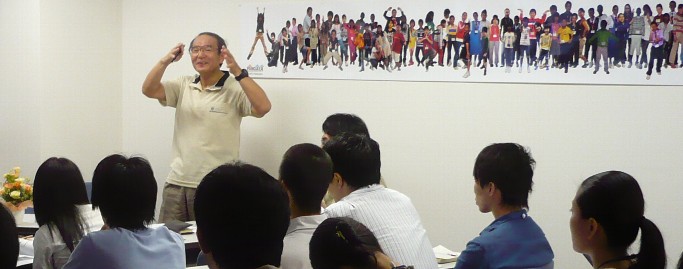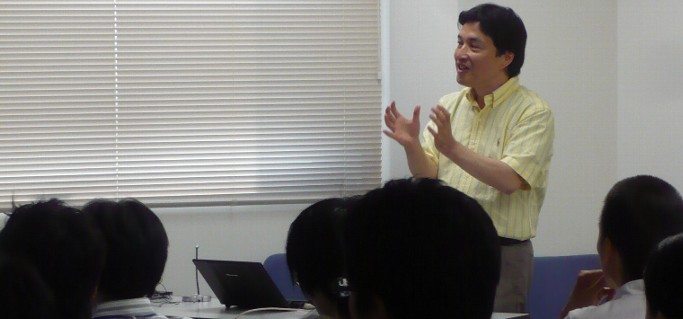 Pangaea Seminar & Workshop 2009!
Pangaea Seminar & Workshop 2009!
I just got back to Kyoto with other staff members from Tokyo where we successfully held our event, the Pangaea Seminar & Workshop 2009. Right after wrapping up our seminars and workshops, we left Tokyo with a sense of fulfillment that we’d got from our big achievement.
It was a one-and-a-half-day weekend event; we had very little time to learn, but could absorb massive amounts of information.

We received a lot of good feedback from our participants. One of the comments said, “I’ve attended a variety of events, but this event was by far the most productive. I enjoyed every single lecture. All lectures were exceptionally informative. I felt that time passed very quickly.” And here is another comment: “The lectures I attended were fun and easy to understand. I am very glad that my questions were answered. Great help!” We deeply appreciate all those who joined and supported our event!

Now I want to briefly talk about our lectures. Every lecture was fascinating, and enabled me to gain new perspectives. The followings were what I learned from two of the lecturers.
Dr. Yuji Inoue delivered a lecture titled, “The Path to 2050: The Case of Japan” in terms of Information and Communication Technology (ICT). He brought up some issues that Japan will confront in the future. Dr. Inoue addressed that the number of consumers will significantly decline in Japan due to its falling birth rate. And he further discussed how Japan should deal with the problem properly at the international level. He made his lecture very clear and understandable to his audience using words, such as “international,” “global,” and “inter-regional.”
Dr. Inoue also talked about standardization and development of technical standards. He showed us pictures of the Roman Roads in Pompeii, which was buried under volcanic ash nearly 2000 years ago, to explain the history of standardization. In addition, he specified the differences between the U.S. and Europe in terms of the concept of and the approach to standardization. He stated that the process of developing technical standards is not only a technical matter, but also a political agenda, for the process involves vested rights. He made me interested in the topic.
Prof. Toru Ishida gave us an audience-friendly lecture on his subject – “Cloud to Crowd” – by illustrating the history and future of computers. He included the following topics: a history of computing from mainframe to cloud computing; how computers were operated; how computers will be utilized; who will use computers; and new computer devices.
Prof. Ishida told us, “A quarter century ago, we used room-sized computers, and people fully believed that computers would be getting smaller.” And he continued, “Actually computers have become smaller. However, I used to ask myself at that time – ‘Why do we need small computers?’ and ‘What’s the use?’ ” “And now we know that it is used in a cell phone technology. And I have been amazed at the way tiny smart phones of today have been used with technologies.” he added. “In 20 years from now, cell phones will shrink to microscopic size like powder. I wonder how we can use such ‘powder’ cell phones. They might be dropped easily and hard to talk because they are too tiny. I think finding possible ways to use the particle-sized cell phones may be a worthy challenge, especially for young people.” he concluded. I nodded in excitement and murmured to myself – “I can’t wait to see the upcoming changes brought about by ICT!”
It was a one-and-a-half-day weekend event; we had very little time to learn, but could absorb massive amounts of information.

We received a lot of good feedback from our participants. One of the comments said, “I’ve attended a variety of events, but this event was by far the most productive. I enjoyed every single lecture. All lectures were exceptionally informative. I felt that time passed very quickly.” And here is another comment: “The lectures I attended were fun and easy to understand. I am very glad that my questions were answered. Great help!” We deeply appreciate all those who joined and supported our event!

Now I want to briefly talk about our lectures. Every lecture was fascinating, and enabled me to gain new perspectives. The followings were what I learned from two of the lecturers.
Dr. Yuji Inoue delivered a lecture titled, “The Path to 2050: The Case of Japan” in terms of Information and Communication Technology (ICT). He brought up some issues that Japan will confront in the future. Dr. Inoue addressed that the number of consumers will significantly decline in Japan due to its falling birth rate. And he further discussed how Japan should deal with the problem properly at the international level. He made his lecture very clear and understandable to his audience using words, such as “international,” “global,” and “inter-regional.”
Dr. Inoue also talked about standardization and development of technical standards. He showed us pictures of the Roman Roads in Pompeii, which was buried under volcanic ash nearly 2000 years ago, to explain the history of standardization. In addition, he specified the differences between the U.S. and Europe in terms of the concept of and the approach to standardization. He stated that the process of developing technical standards is not only a technical matter, but also a political agenda, for the process involves vested rights. He made me interested in the topic.
Prof. Toru Ishida gave us an audience-friendly lecture on his subject – “Cloud to Crowd” – by illustrating the history and future of computers. He included the following topics: a history of computing from mainframe to cloud computing; how computers were operated; how computers will be utilized; who will use computers; and new computer devices.
Prof. Ishida told us, “A quarter century ago, we used room-sized computers, and people fully believed that computers would be getting smaller.” And he continued, “Actually computers have become smaller. However, I used to ask myself at that time – ‘Why do we need small computers?’ and ‘What’s the use?’ ” “And now we know that it is used in a cell phone technology. And I have been amazed at the way tiny smart phones of today have been used with technologies.” he added. “In 20 years from now, cell phones will shrink to microscopic size like powder. I wonder how we can use such ‘powder’ cell phones. They might be dropped easily and hard to talk because they are too tiny. I think finding possible ways to use the particle-sized cell phones may be a worthy challenge, especially for young people.” he concluded. I nodded in excitement and murmured to myself – “I can’t wait to see the upcoming changes brought about by ICT!”
Posted by: kumakinoko | | Permalink


 Hello, everyone!
Hello, everyone! This month, a message from a mother whose son is our participant is featured
in the Pangaea Ring. Her son joined our program three years ago and loves to
create computer animations. In Kyoto, he has been our teacher and "onsite
technical support" in the field of computer animation.
This month, a message from a mother whose son is our participant is featured
in the Pangaea Ring. Her son joined our program three years ago and loves to
create computer animations. In Kyoto, he has been our teacher and "onsite
technical support" in the field of computer animation.

